| Srl | Item |
| 1 |
ID:
177676
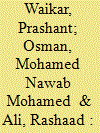

|
|
|
|
|
| Summary/Abstract |
This paper analyses the role of Islam in Malaysian foreign relations under the Premiership of Najib Razak. While most observers acknowledge the importance of Islam to Malaysian foreign policy making under Prime Ministers Mahathir Mohamad (1981 to 2003) and Abdullah Badawi (2004 to 2008), they tend to underplay its significance in Najib’s tenure as leader of Malaysia. Departing from this, we suggest that Islam was significant in Najib’s foreign policy in three ways. First, Najib utilized regional and international conflicts involving Muslims, particularly the Rohingyas and Palestinians, in order to construct Malaysia as a guardian of disenfranchised Muslims. Second, Najib relied on the notion of wasattiyah (the middle way) in order to buttress Malaysia’s image as a moderate Muslim country. Finally, Najib rationalized Malaysia’s alignment with Saudi Arabia in the Saudi-Iran geopolitical rivalry in religio-political terms. To make these arguments, we utilize a state identities approach to studying foreign policy. We unpack the notion of Muslim state identity into three manifestations: the activist Muslim state, the moderate Muslim state, and the Sunni Muslim state. The paper draws on both primary and secondary sources. We conclude with the conceptual implications of our argument.
|
|
|
|
|
|
|
|
|
|
|
|
|
|
|
|
| 2 |
ID:
152531
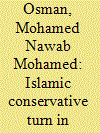

|
|
|
|
|
| Summary/Abstract |
In contrast to the allegedly puritan, ‘intolerant’ Islam practiced in the Middle East, Islam in Malaysia has always been portrayed especially in Western media as rather moderate. Given the fact that Islam in Malaysia has taken a conservative turn since the 1980s, such assertions are increasingly problematic. This paper attempts to explain the Islamic conservative turn in Malaysia and identify its social and political implications. It seeks to highlight how this conservative turn will impact Malaysian society and politics. An important impact that will be discussed in the paper is the emergence of neo-Sufi and neo-Salafi movements. The paper will end by examining the future trajectory of Islam in the country.
|
|
|
|
|
|
|
|
|
|
|
|
|
|
|
|
| 3 |
ID:
164973
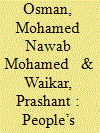

|
|
|
|
|
| Summary/Abstract |
While the Singapore government has sought to construct the elected presidency as an institution critical to Singapore’s political system, the result in fact forces the institution to contradict itself. This paradox has important implications for politics in a post–Lee Hsien Loong Singapore.
|
|
|
|
|
|
|
|
|
|
|
|
|
|
|
|
| 4 |
ID:
090203
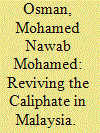

|
|
|
|
|
| Publication |
2009.
|
| Summary/Abstract |
Operating in over 43 countries in the world, Hizbut Tahrir (HT) is presently active in Europe, the Middle East, Africa, and more recently in Asia. Today, HT is becoming increasingly prominent in Southeast Asia, especially in Indonesia and Malaysia. Yet despite its rapid growth in the region, little is known about HT chapters in Southeast Asia, especially in Malaysia. In light of the dearth in scholarship on Hizbut Tahrir Malaysia (HTM), this article aims to shed some light on the HTM and analyze the likelihood of its emergence as a political force in the country.
|
|
|
|
|
|
|
|
|
|
|
|
|
|
|
|
| 5 |
ID:
099660
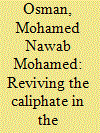

|
|
|
|
|
| Publication |
2010.
|
| Summary/Abstract |
Hizbut Tahrir (HT) is a transnational Islamic movement operating in over forty-five countries. Literature on HT has focused mainly on its activities in Central Asia and Europe. As such, when the HT chapter in Indonesia organized the largest-ever political gathering staged by HT, many observers were caught by surprise. Yet despite the importance of Hizbut Tahrir Indonesia (HTI), little is known about the organization in the English-speaking world. This paper is an attempt to present empirical data on this group. The paper argues that HTI's usage of different mobilization strategies has resulted in its ability to effect policy changes in Indonesia.
|
|
|
|
|
|
|
|
|
|
|
|
|
|
|
|
| 6 |
ID:
101350


|
|
|
|
|
| Publication |
2010.
|
| Summary/Abstract |
This paper explores the regional network of the Indonesian chapter of Hizbut Tahrir (HT), a transnational Islamic group aiming to revive the Islamic Caliphate. Focusing on the chapter of HT in Indonesia, the paper highlights how Hizbut Tahrir Indonesia (HTI) supports the activities of other HT chapters in the region and beyond. The key argument of the paper is that an understanding of HTI's transnational activism brings new insights to the current understanding of HT as a transnational movement. The author seeks to show the linkages between HTI and other HT chapters around the world and to analyse the implications of HTI's transnational activism.
|
|
|
|
|
|
|
|
|
|
|
|
|
|
|
|